Synergy in Collaborative Projects Through NFT Credentials
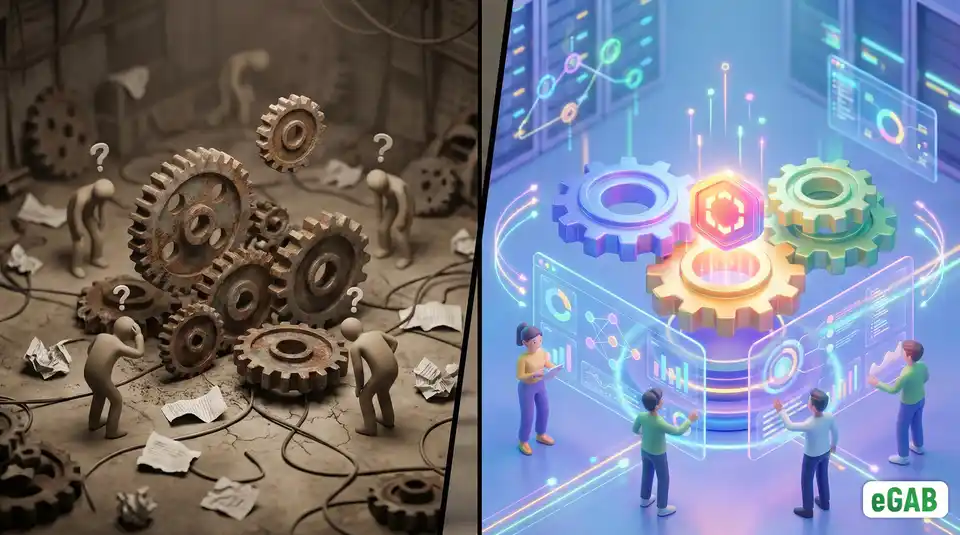
 Author:
Artem Grigoriev
Author:
Artem Grigoriev
- How Do Verifiable Credentials Build Instant Trust Among Team Members?
- How Can Smart Contracts Automate Fair Contribution Tracking?
- Why Do Tokenized Rewards Enhance Engagement and Motivation?
- How Does Blockchain Clarify Intellectual Property and Project Ownership?
- Summary: Building Truly Accountable and Synergistic Teams
Let's be honest. The term "group project" can make even the most optimistic person shudder. We've all been there, haven't we? It doesn't matter if it's a university lecture hall or a corporate boardroom; the same old, frustrating problems always pop up. Who is really pulling their weight? Who ultimately gets the credit? And here is the crucial part: how can you even trust the skills of the people you've just met?
That friction and total lack of transparency? It is the single biggest killer of any real collaborative synergy. But what if there was a way to build trust, accountability, and fair recognition right into the project's foundation? And what if you could do it straight from day one?
This is exactly where blockchain in project management steps in. It is truly starting to change the game. It moves way beyond simple task-tracking to fundamentally shift how we collaborate. The key to all of this? NFT credentials . In this article, we will break down precisely how this technology works. This includes powerful tools like non-transferable Soulbound Tokens (SBTs) . We'll see how it creates a reliable single source of truth. We'll explore how these verifiable credentials work to build instant trust. We will also look at how smart contracts can finally automate fair contribution tracking. This means saying goodbye to the "free-rider problem"! And, we will see how tokenized rewards and clear IP management can be combined. This unlocks the high-performing synergy that every team is striving for.
Collaboration is the lifeblood of modern innovation, but let's face it: it is often messy. Managing diverse teams, tracking contributions, and ensuring fair credit can feel a lot like herding cats. So, what if you could fundamentally fix the "mess" right at its source? This is precisely where blockchain in project management is emerging as a revolutionary new force. It isn't just about tracking tasks on a decentralized ledger; it's about embedding trust and accountability deep into the very fabric of a project. We are now seeing a fundamental shift with the rapidly expanding use of NFT credentials for collaboration . This naturally leads many to ask: what is the role of blockchain in team collaboration when it comes to building high-performing teams, not just managing workflows? It all starts with solving the most human problem of all: trust.
🧭 This strategy for automated collaboration is a key practical application of the credentialing ecosystem defined in the Complete Guide to Digital Documents.
How Do Verifiable Credentials Build Instant Trust Among Team Members?
Ever been assigned to a new project team? And did you get that sinking feeling, perhaps wondering if everyone on that team can really do what their resume claims? In today's fast-paced, dynamic environments, that "trust gap" is a very real problem and a major source of friction. We’ve all seen those polished LinkedIn profiles, but let's be real: they are self-reported and often hard to verify quickly. This is precisely where NFT credentials come in to completely change the game. You might ask, what are NFT credentials? Simply put, they are unique, tamper-proof digital certificates that live on a blockchain, making them perfect for creating verifiable credentials for project teams .
Think of them as an instant "proof-of-skill." And no, we're not talking about cartoon apes when we discuss NFTs in this context; we are talking about specific, non-transferable tokens. A good example of this is Soulbound Tokens (SBTs) . So, what is a Soulbound Token? Unlike a standard NFT, an SBT is permanently tied to a person's digital identity, making it a perfect vehicle for Soulbound Tokens (SBTs) in collaboration precisely because they can't be transferred or sold. The key thing is that these tokens are tied directly to your identity, a concept that forms the bedrock of Decentralized Identity (DID), where you control your own verifiable information rather than a third-party company. They simply can’t be faked. A project lead, for instance, might use a platform like credly.study to get immediate, provable confirmation of a new member's competence. This is exactly how you build trust with NFT credentials; the proof is cryptographic, not just a line of text on a resume. This focus on verifiable skills means a verification process that used to take days is reduced to mere seconds. But you might be wondering, are NFT credentials secure? Absolutely-because they leverage the cryptographic security of the blockchain, they are far more secure than a traditional database, which is highly vulnerable to hacking.
Of course, trust is only as good as the verifier. A credential issued by a single university's internal portal is like a silo: it's locked in and might not be recognized by an external partner, which completely defeats the purpose. This is where the eGAB (Global Academic Blockchain) ecosystem provides a powerful solution. It is built on global standards like the W3C Verifiable Credentials model, ensuring true interoperability so your skills can be recognized by anyone, on any platform, not just within one locked system. Think of it as a globally recognized Trusted Third Party (TTP). When a credential comes from eGAB, it is backed by a global standard, which fosters immediate psychological safety. (By the way, Google's multi-year "Project Aristotle" study identified this very psychological safety as the single most important dynamic of high-performing teams). This trust builds among team members immediately, creating an immutable history of contribution. Professionals carry this reputation in their personal digital wallet , giving them complete ownership and control over who they share their achievements with. This is the core of how can you verify skills using NFTs?-the verification is built into the token itself, accessible 24/7.
Perhaps most importantly, this transparency also helps to eliminate bias . The system provides a neutral, factual record of a participant's strengths, which is viewable on credly.study, so team formation can finally be based on validated data, not just on social connections or a person's reputation. Everyone enters the collaboration with a clear, honest understanding, knowing what each member truly brings to the table.
Why It Matters: Instant verification isn't just about speed. It's about building psychological safety right from day one. When teams trust each other's proven skills, they get to skip that awkward "vetting" phase. They can jump straight into high-level, creative collaboration.
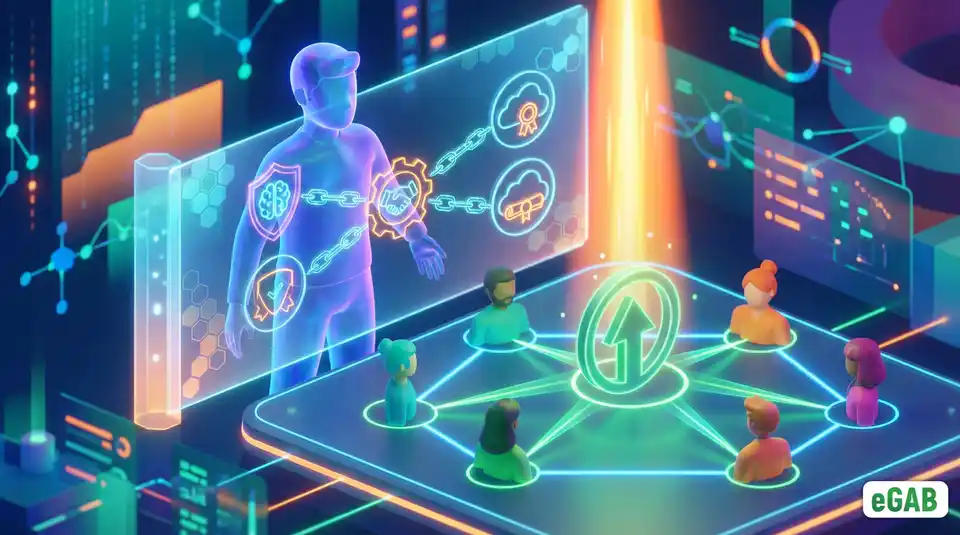
How Can Smart Contracts Automate Fair Contribution Tracking?
Let’s be honest: the "free-rider problem" is the dread of every group project. We've all been there. This phenomenon is known in social psychology as "social loafing." It describes the tendency for individuals to exert less effort in a group setting than when working alone, often due to a perceived lack of individual accountability. There's always that one person who seems to do nothing, but they still get their name on the final report. The good news is, there's a real solution. Integrating NFT credentials with smart contracts provides a powerful, automated, and transparent fix. This is the essence of solving the "free-rider problem" with blockchain : creating a system where inaction is just as visible as action, effectively solving this age-old problem. So, how do NFTs solve the "free-rider" problem in projects? They act as the "key" that receives the rewards, and the smart contract-the "lock"-only releases those rewards when its rules (the completed tasks) are met.
A smart contract can act as a kind of digital referee. This is smart contract contribution tracking in action. It automatically tracks milestones as they’re completed. This process of automated contribution tracking removes the project manager from the uncomfortable role of "enforcer" and turns them into a "facilitator." It also records every member's input onto an immutable ledger. Now, this isn't just a threat to ensure participation; it's a transparent system of accountability that everyone involved can see. It effectively solves the "free-rider" problem by making contributions (or a lack thereof) completely indisputable.
Now, you might be thinking, "Won't that be expensive on a blockchain?" And you'd be right, in most cases. If you tried to build a custom tracking solution on a public blockchain like Ethereum, you'd have a serious problem. The "gas fees" (transaction costs) for frequent updates would be prohibitively expensive. This is exactly why the eGAB ecosystem is so critical: it runs on the proprietary CREST Chain , which is a specialized blockchain designed specifically for educational data. The bottom line? This architecture allows for cost-effective, high-frequency updates to contribution records, which makes real-time tracking truly feasible.
This system can even support real-time dynamic updates. Imagine an NFT credential that visually "levels up," or maybe it evolves as a contributor successfully completes specific modules. eGAB supports this granular level of tracking, providing a verifiable status of engagement. This is something a static PDF certificate simply cannot match. All this automation also massively reduces administrative overhead (the 'busy work' of managing and checking up on people). It shifts the focus from a project manager policing participation to actual creative collaboration. It's the classic "Buy vs. Build" dilemma (the choice between paying for a ready-made product or creating one from scratch). By utilizing the eGAB ecosystem, you essentially "buy" a turnkey solution (a system that is ready to use immediately). This helps you avoid the immense technical and financial burden-specifically, the burden of building and maintaining your own complex verification infrastructure (the underlying technology framework).
Takeaway: Smart contracts on the CREST Chain shift the dynamic from "policing" contributions to "proving" them. When effort becomes a transparent, immutable record, it naturally motivates participation. It also ensures everyone is recognized fairly for their work.
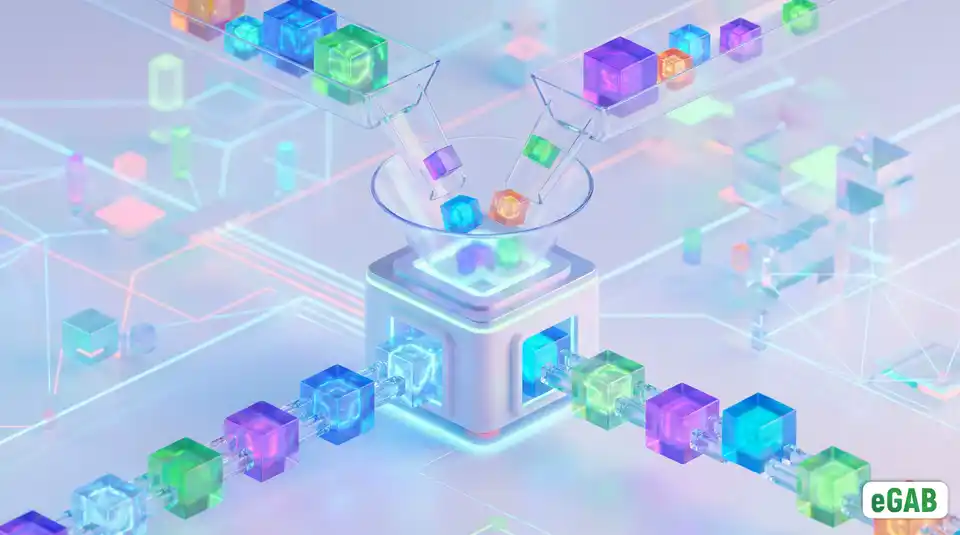
Why Do Tokenized Rewards Enhance Engagement and Motivation?
Tracking contributions is one thing. But how do you recognize them in a way that truly matters? This is precisely where tokenized rewards can radically enhance engagement and motivation. Using tokenized rewards for project engagement is a powerful psychological tool that shifts the dynamic from a "job" to a "mission." We're talking about moving way beyond "employee of the month" plaques. We mean offering something with real, lasting value.
Instead of just a "thank you" email, what if small wins were rewarded? You could give these for granular milestones-small, specific achievements-transforming them into permanent assets. These micro-credentials, issued as NFTs, serve as immediate positive reinforcement. But here is the key difference: within the eGAB ecosystem, these aren't just temporary badges inside a project management tool; they become permanent digital assets, stored securely in the user's credly.study digital wallet. This simple act turns a short-term project win into a long-term career asset. This is a perfect example of gamification with NFT rewards , where the "prize" isn't just points on a leaderboard, but a real, ownable asset.
This approach also introduces gamification-applying game-design elements to non-game contexts-with real value. Research from firms like Gartner has consistently shown this: well-implemented gamification strategies can improve employee engagement and boost task completion rates significantly, in some cases by over 40%. Unlocking unique NFT attributes can signify mastery of complex tasks. And because eGAB adheres to global standards like W3C Verifiable Credentials (an open standard for digital credentials that are tamper-proof and cryptographically verifiable), these rewards have real power. They hold tangible utility beyond the immediate project because they are verifiable and portable, and they can also be used to unlock future opportunities in a person's career.
These digital assets can even grant utility (practical use) and governance (decision-making power) as well. Imagine your contribution token giving you voting rights for making key project decisions, perhaps in a DAO-like (Decentralized Autonomous Organization) structure. eGAB facilitates this by providing a standardized framework where these tokens are recognized and interoperable. This is a far cry from those isolated local platforms, where rewards lose all their value once the user leaves that specific environment. By tangibly rewarding effort with permanent digital assets, you boost intrinsic motivation . Participants own a portable record of their specific role in the project's success, which is securely anchored on the CREST Chain , ensuring their hard work is preserved and recognized forever.
Quick Insight: When a reward is a permanent, verifiable asset you truly own, it's just different. Think of an NFT in your credly.study wallet. This taps into a powerful human motivator: ownership. People simply work harder. They are more engaged when they are building something of lasting value for themselves.

How Does Blockchain Clarify Intellectual Property and Project Ownership?
In any major collaborative project, one of the most contentious issues is a simple one: "Who really did what?" Disputes over authorship and intellectual property (IP) can get messy, and they can derail even the best teams. This is where blockchain, combined with NFT credentials , offers a solution-a brilliantly clear and permanent one. Using blockchain for intellectual property (IP) management isn't just a hypothetical idea anymore; it's a practical solution to one of collaboration's biggest challenges.
The system creates an immutable provenance (a permanent history of origin) for ideas and outputs. What does that actually mean? Well, think about a custom-built database on a university's internal server. A system administrator could, in theory, alter the records. The CREST Chain, however, provides an immutable, decentralized ledger (a shared record book that isn't controlled by any single person or entity). This guarantees that the record is permanent and tamper-proof. It shows exactly who created what and when they created it, providing a layer of security and trust that is simply superior to traditional internal servers.
This technology also opens the door to fascinating new models like fractionalized ownership . Here is how it works: The final project output-such as a research paper, a piece of software, or even a work of art-can be minted as a fractionalized NFT. Ownership stakes can then be distributed automatically, based on the verified contributions we tracked with smart contracts. The eGAB ecosystem provides the secure infrastructure needed for this, helping to manage these complex ownership structures. This ensures credit attribution is handled by a neutral, automated system, not left to human bias or politics.
This structure is a game-changer for automating citations and royalties . The smart contract can be pre-coded to ensure a clear distribution of any future royalties or academic citations. Your credly.study profile acts as the verified interface for this data, which ensures every contributor receives credit proportional to their actual input, long after the project is finished. Finally, this creates portable project portfolios . The system creates a permanent link between the creator and their work, unlike those local "build" solutions where data is trapped within a single institution. eGAB ensures interoperability, which allows students and researchers to carry their project portfolio with them across different institutions, platforms, and jobs. This solves the critical problem of IP portability for their entire career.
Next Step: Think of the blockchain as the ultimate, automated notary. By time-stamping every key contribution on the CREST Chain , you're not just tracking work. You're creating an indisputable legal and academic record of provenance. This record protects every single contributor involved.
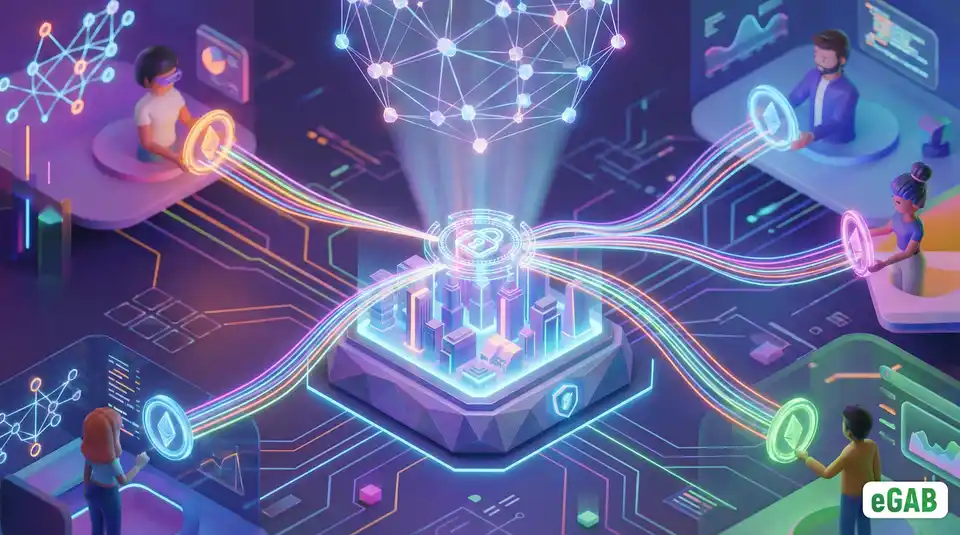
Summary: Building Truly Accountable and Synergistic Teams
So, what is the big takeaway from all this? This article is really about a fundamental shift. We are moving away from the typical "mess" of group projects and moving decisively toward a new model. It is one that is built on real, verifiable trust and accountability.
It all starts with solving that nagging "trust gap." By using NFT credentials -specifically non-transferable Soulbound Tokens (SBTs)-teams can finally move past old-school resumes that just say what people claim they can do. This system is built on Decentralized Identity (DID) and uses global standards like the W3C Verifiable Credentials (all found within the eGAB ecosystem). This gives you instant, cryptographic "proof-of-skill." What this means, in practice, is you immediately establish psychological safety, which is vital for high-performing teams (precisely what Google's Project Aristotle found was key). You get to eliminate bias and let everyone collaborate with total confidence, right from day one.
But, as we saw earlier, trust is just the start. The system extends that same level of accountability to the work itself by using smart contracts for automated contribution tracking . Here is the thing: this process creates a transparent, unchangeable ledger that basically solves the 'free-rider problem' (also known as "social loafing"). How? Everyone's effort-or their lack of it-is made visible to the whole team. While "gas fees" on public blockchains would make this expensive, the proprietary CREST Chain (part of the eGAB ecosystem) is different; it is built for these exact kinds of cost-effective, real-time updates. This tracking feeds right into a powerful motivation system: tokenized rewards for project engagement. You can use gamification with NFT rewards to turn even small, granular milestones into permanent, valuable assets stored in the user's credly.study digital wallet. This skillfully taps into that basic human desire for ownership and boosts intrinsic motivation.
Finally, having this entire, transparent record gives you an elegant solution to one of the biggest headaches in any collaboration: blockchain for intellectual property (IP) management . The CREST Chain creates an "immutable provenance." What does that mean? It is just a secure way of saying it builds a permanent, unchangeable history of every single idea and contribution. That is a record far more secure than any internal server could ever be. This system makes clear credit attribution easy and even allows for fractionalized ownership of the final project, letting you automate royalties and citations with a simple smart contract.
The bottom line is this. By integrating trust, tracking, motivation, and IP, this framework doesn't just manage a project; it creates a permanent, portable, and verifiable portfolio of each person's individual contribution. This is what fosters a truly synergistic environment where everyone is fairly and transparently recognized for the work they actually did.
🚀 Ready to apply this? You understand how blockchain solves the "free-rider" problem in projects. Now, get the specific roadmap for the people involved by reading the Guide for Students and Educators.
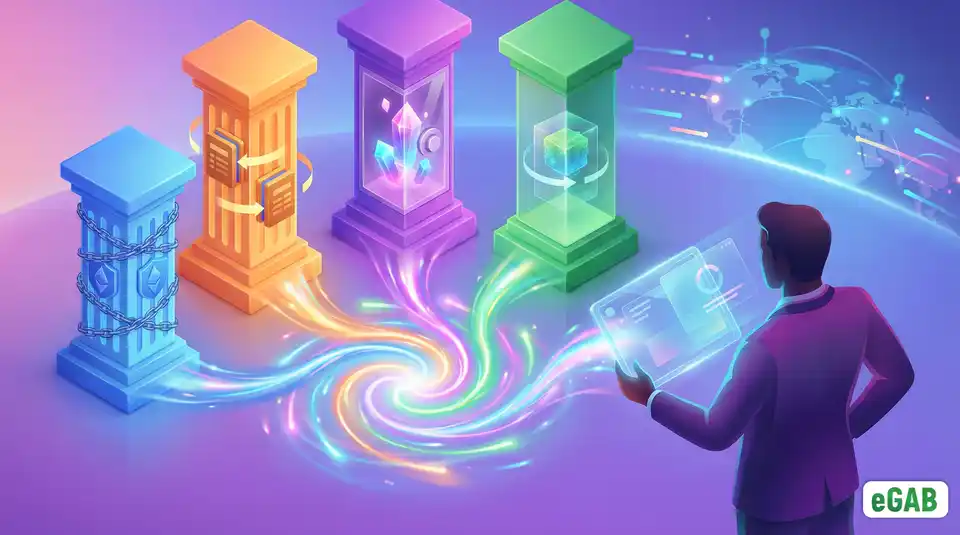
The Role of TTP in the Global Recognition of NFT Credentials
The Impact of NFT Credentials on Traditional Education Systems
Marketing NFT Credentials: Efficiency Analysis, Research, and Experiments
FAQs on NFT Credentials in Education: Everything You Need to Know
Top Platform for Issuing NFT Credentials: Introducing TTP Credly.study
